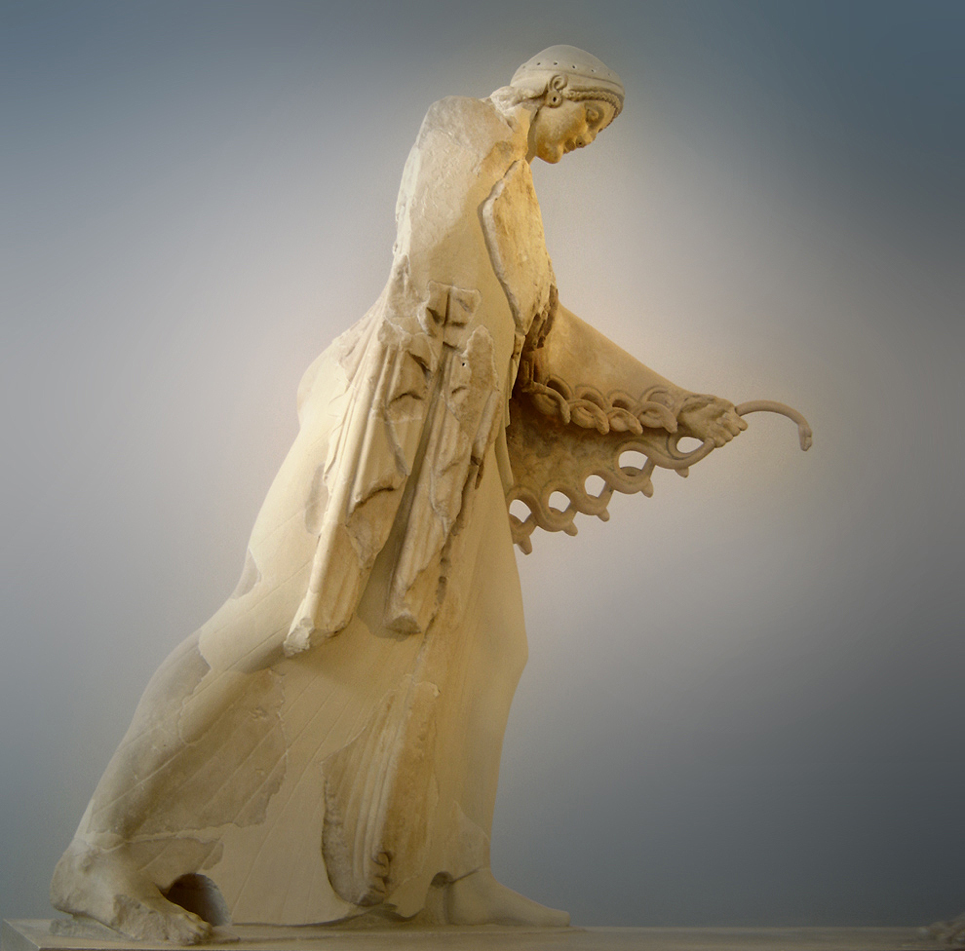Athena
Roman name: Minerva
Epithets: Pallas (maiden), Tritogeneia (unknown meaning), Promachus (one who fights for her city), Ergane (artisan or worker), Owl-Eyed, Polias (protector of the city), Parthenios (virgin), Gray-Eyed
Symbols: owl, Nike, olive tree, aegis, snake
Functions: goddess of just wars, wisdom, and crafts; patroness of Athens; and helper of heroes
The Birth of Athena
Athena was the daughter of Zeus and his first wife Metis. Gaia told Zeus that Metis would first bear a daughter then a son who would overthrow his father. Zeus, like his father and grandfather before him, wanted to avoid this fate, so when Metis became pregnant, he swallowed his wife whole [see Zeus]. After a few months, Zeus developed a splitting headache and asked Hephaestus (or in some versions, the Titan Prometheus) to help him relieve the pressure. Hephaestus took up his axe and split open Zeus’ head, and out jumped Athena, fully dressed in armor. Another tradition has it that Athena was born near a river called Triton, an etymological aetiological myth that was created to explain her epithet Tritogeneia.
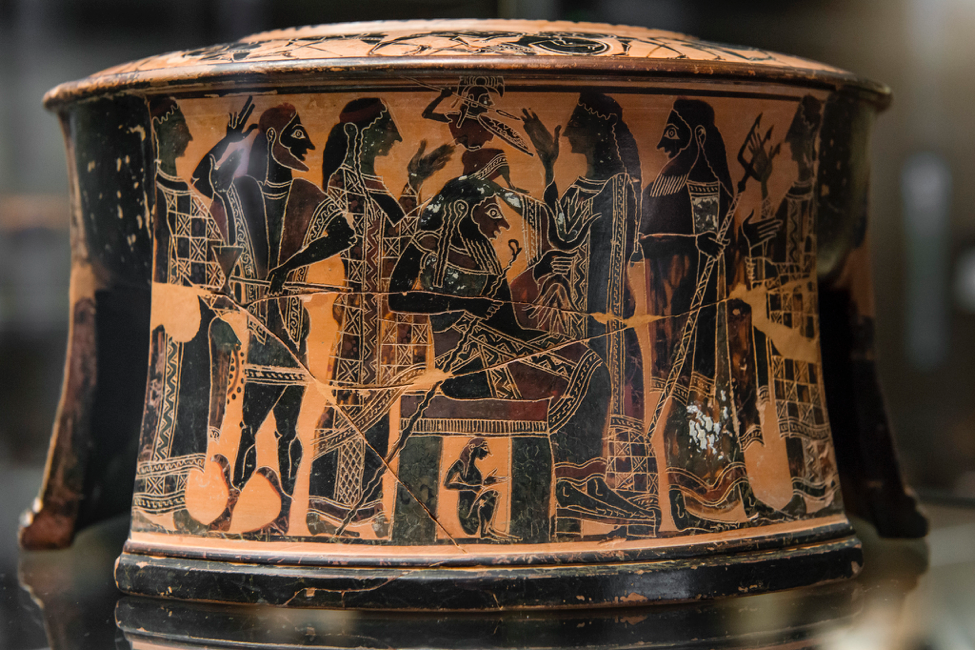
Athena as the Protector of Heroes
Athena was particularly fond of courageous youths and helped many heroes in their quests. When Perseus was sent to kill the Gorgon, Medusa, Athena provided the sword and shiny shield needed to slay the Gorgon without looking at her. She gave the hero Bellerophon the golden bridle he needed to ride the winged horse, Pegasus; by riding on Pegasus’ back, Bellerophon was able to kill the monster, Chimera. The Argonauts were saved from the Clashing Rocks by Athena’s help [see Argonauts]. Odysseus, however, because of his cunning, was one of Athena’s favorite mortals. Odysseus’ return home after the Trojan War was only possible because of Athena’s machinations. Her intervention also helps him survive the Greater Ajax’s wrath in Sophocles’ Ajax. Whenever Odysseus is depicted in a myth, Athena is never far away.
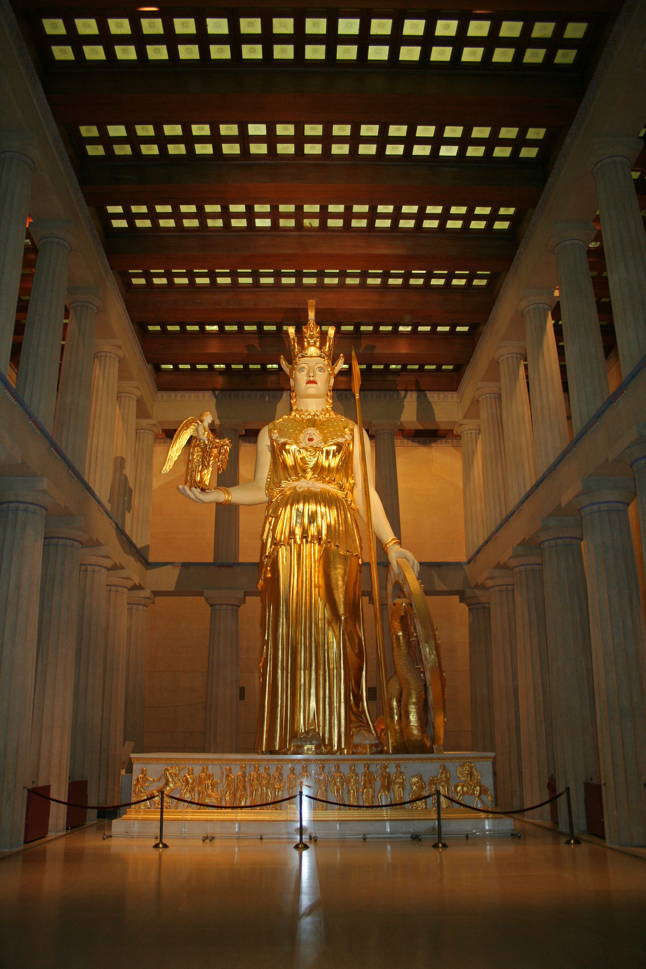
Athena and Arachne
Athena, like the other gods, was quick to punish mortals who thought they were equal to the gods. One such mortal was the weaver, Arachne. Arachne boasted that her weaving was as good as Athena’s. Athena was angry and challenged Arachne to a contest of weaving. Athena wove a tapestry depicting mortals who challenged the gods and were punished. Arachne answered with a tapestry depicting the scandalous behavior of the Olympians. It was obvious that Arachne’s skill was equal to Athena’s, and Athena was livid so she beat the girl mercilessly. Arachne chose to hang herself to end her suffering, but Athena was not yet done with her and turned Arachne into a spider, giving the tiny animal its name in Greek (arachne, ἀράχνη) and its practice of weaving webs.
Athena as the Protector of Athens
The city of Athens was named after Athena because she was the Athenians’ protector and benefactor, but she had earned that right by winning a competition with Poseidon for patronage over the city. Differing versions say that either Zeus (and possibly other gods) or a committee of Athenian kings judged the contest. Either way, each divinity was asked to provide a gift for the city and the judges would decide who had given the better gift. Poseidon struck a rock with his trident and out came a spring of saltwater, but Athena grew an olive tree. The judges decided that the olive was more useful than the spring and awarded Athena the city. When Athena was not living on Olympus, she often lived in the Parthenon, the temple to her on the Acropolis in Athens. Thus, when Orestes came to Athena to judge whether he should be punished for the murder of his mother, Clytemnestra, he came to her in Athens. Athena used this opportunity to establish the Areopagus council as the official court in Athens [see Oresteia].
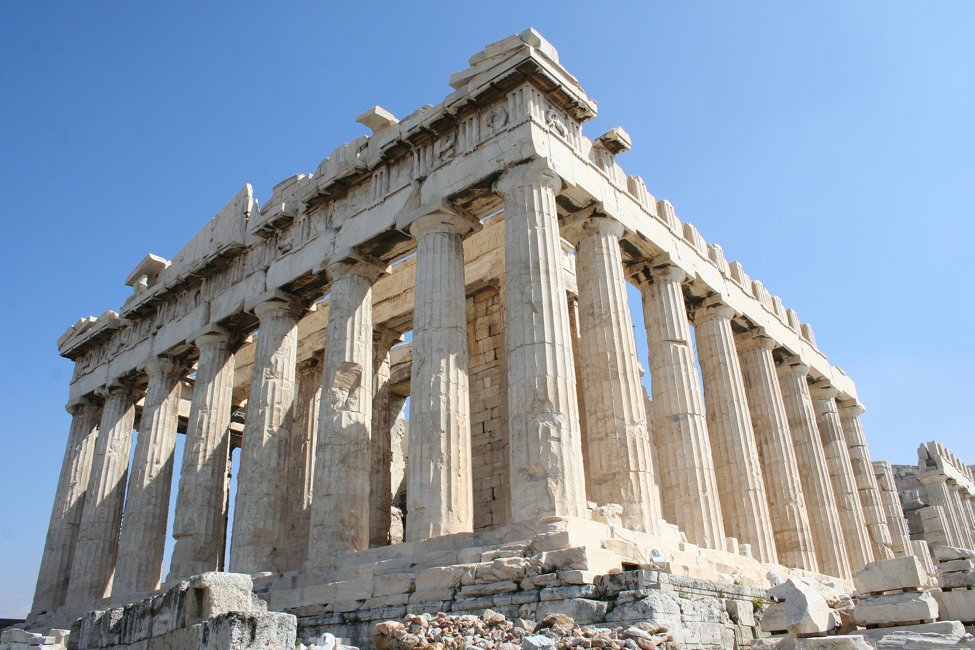
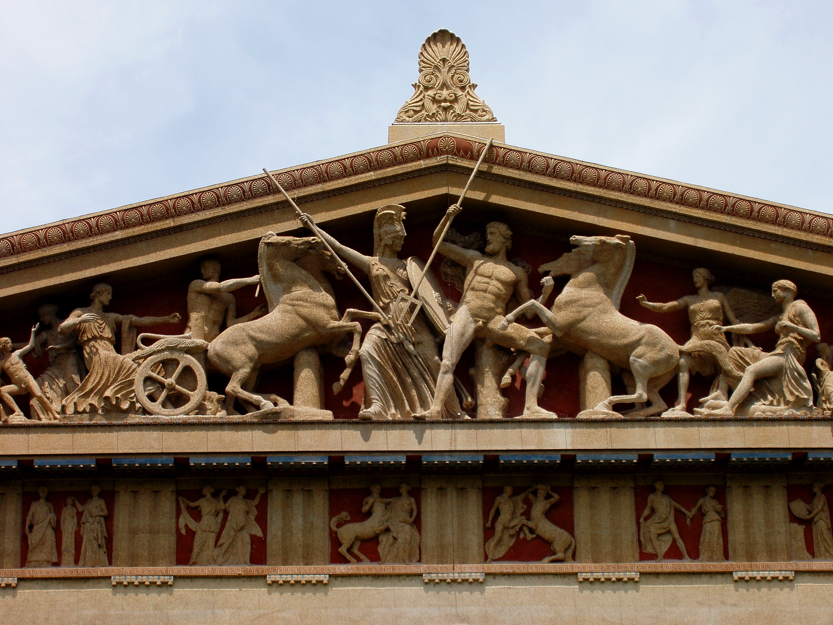
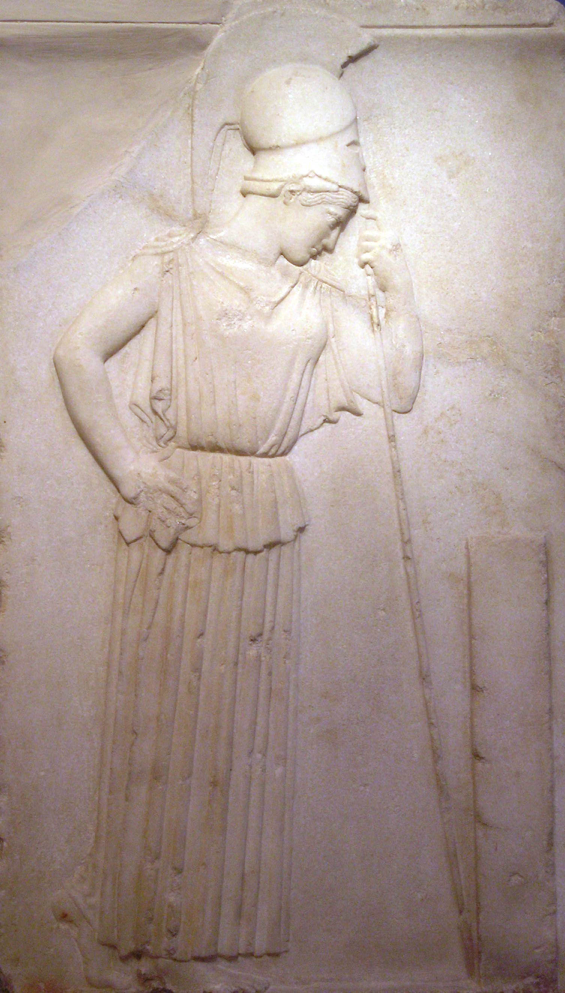
Athena’s Virginity
Like the other virgin goddesses (Artemis and Hestia), Athena sometimes had to work to preserve her virginity against the advances of other immortals. One such instance was when Hephaestus attempted to rape her. She managed to break away from him before he could violate her, but his semen fell to the ground. A child was born from the mixing of the semen and the earth, and he was named Erichthonius. Athena took the child and raised him in her temple, and he eventually became one of the earliest Kings of Athens.
The Aegis
Athena held the unique favor of her father and was allowed to use his aegis [see Aegis]. More often than not, it is Athena, not Zeus, who is depicted with the aegis. Athena is usually shown with the severed head of Medusa either on her aegis or on her shield. Perseus gave her Medusa’s head in gratitude for her aid in helping him kill the Gorgon.
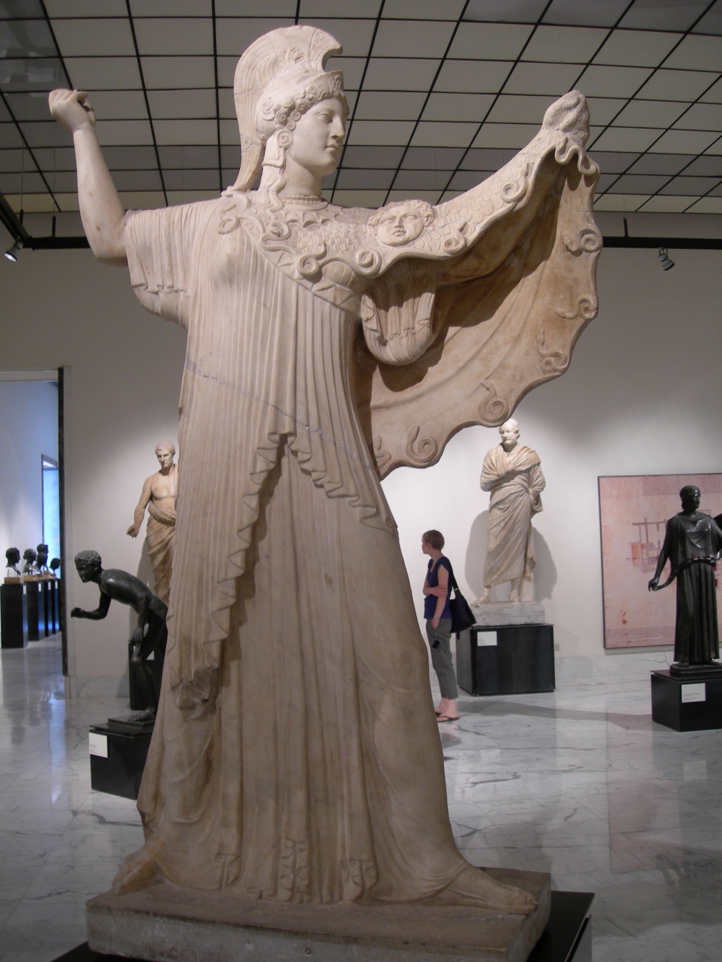
Athena and the Lesser Ajax
Because of Paris’ decision in the beauty contest between Athena, Hera, and Aphrodite, Athena sided with the Greeks when the Trojan War broke out [see Intro to Iliad]. This did not stop her from brutally punishing the Lesser Ajax for an atrocity he committed during the sack of Troy. (The Lesser Ajax was so called to distinguish him from the more famous warrior who was also named Ajax. The more famous Ajax was known as the Greater Ajax.) As the Greeks were sacking Troy, raping and pillaging as they went, Cassandra, a daughter of Priam, sought protection in Athena’s temple. When a person seeks the protection of a god or goddess in that deity’s temple, that person becomes sacred and should not be harmed. But Ajax pulled Cassandra away from the statue of Athena, which she was clutching. He then raped Cassandra in Athena’s temple, enraging the goddess with his sacrilege and desecration of her temple. She enlisted the help of Poseidon to destroy him. On his way home, Ajax’s ships crashed onto rocks, but Ajax survived, shouting to the heavens, “not even the gods can kill me!” This boast infuriated Poseidon, who split the rock Ajax was clutching, causing him to fall into the sea and drown (Homer, Odyssey, 4.499-511).
The Origin of Athena
Athena may possibly have originated as a warrior goddess of the Mycenaeans, an early Greek-speaking people based in the Peloponnese. She is associated with snakes, but it is not clear what the significance of the snake is to Athena.
